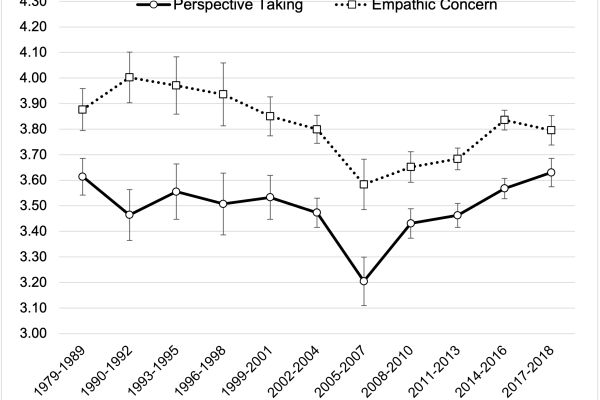Empathy is the ability to recognize, understand, and share the thoughts and feelings of another person, animal, or fictional character. Developing empathy is crucial for establishing relationships and behaving compassionately. It involves experiencing another person’s point of view, rather than just one’s own, and enables prosocial or helping behaviors that come from within, rather than being forced.
Some surveys indicate that empathy is on the decline in the United States and elsewhere, findings that motivate parents, schools, and communities to support programs that help people of all ages enhance and maintain their ability to walk in each other’s shoes.

Empathy helps us cooperate with others, build friendships, make moral decisions, and intervene when we see others being bullied. Humans begin to show signs of empathy in infancy and the trait develops steadily through childhood and adolescence. Still, most people are likely to feel greater empathy for people like themselves and may feel less empathy for those outside their family, community, ethnicity, or race.
Empathy helps us connect and help others, but like other traits, it may have evolved with a selfish motive: using others as a “social antenna” to help detect danger. From an evolutionary perspective, creating a mental model of another person's intent is critical: the arrival of an interloper, for example, could be deadly, so developing sensitivity to the signals of others could be life-saving.
Babies display an understanding that people’s actions are guided by intentions and are able to act on that understanding before they are 18 months old, including trying to comfort a parent. More advanced reasoning about other people’s thoughts develops by around age 5 or 6, and research shows that parents who promote and model empathy raise more empathetic children.
Empathy, sympathy, and compassion are often used interchangeably, but they are not the same. Sympathy is feeling of concern for someone else, and a desire that they become happier or better off, while empathy involves sharing the other person’s emotions. Compassion is an empathic understanding of a person's feelings accompanied by altruism, or a desire to act on that person's behalf.
Researchers believe people can choose to cultivate and prioritize empathy. People who spend more time with individuals different from themselves tend to adopt a more empathic outlook toward others. Other research finds that reading novels can help foster the ability to put ourselves in the minds of others. Meditation has also been shown to help cultivate brain states that increase empathy.
Some neuroscientists have advanced the concept of "mirror neurons” as a possible source of empathy. These neurons, it is theorized, enhance the capacity to display, read, and mimic emotional signals through facial expressions and other forms of body language, enhancing empathy. But whether mirror neurons actually operate this way in humans is a subject of longstanding scientific debate, and some scientists question their very existence.

The ability to convey support for a partner, relative, or friend is crucial to establishing positive relationships. Empathy enables us to establish rapport with another person, make them feel that they are being heard, and, through words and body language, mimic their emotions. Perspective-taking, or the empathic ability to assume the cognitive state of another person and see a problem through their eyes, can further cement a connection.
In healthy relationships, people expect their partners to empathize with them when they face hardship or personal struggles, but the ability to empathize with a partner in good times may be at least as important. In one study, displaying empathy for a partner’s positive emotions was five times more beneficial for relationship satisfaction than only empathizing with his or her negative emotions.
People high in narcissism, or who have narcissistic personality disorder, can exhibit empathy and even compassion. However, that ability only goes so far, as ultimately their own needs come first. Some researchers believe narcissists can develop greater empathy by developing greater self-compassion, which can increase their own feelings of security and self-worth and enable them to open up to hearing others.

Putting yourself in someone else’s shoes can be beneficial, but when it becomes one’s default mode of relating to others, it can blind an individual to their own needs and even make them vulnerable to those who would take advantage of them.
People who regularly put the feelings and perspectives of others above their own may experience feelings of emptiness or alienation and develop generalized anxiety or low-level depression. Psychopaths, on the other hand, are capable of empathic accuracy, or correctly inferring thoughts and feelings, but may have no experiential referent for it: a true psychopath does not feel empathy.
First responders, humanitarian aid workers, doctors, therapists, journalists, and others whose work involves opening themselves up to others’ pain tend to be highly empathic. However, they may come to share the heartbreak of those they help or whose stories they record. As such “emotional residue” accumulates, they may shut down, burn out, and become less willing or able to give of themselves.
Empaths are often characterized as being highly sensitive and overly focused on the needs of others. They may benefit from time alone, as they find it draining to be in the presence of other people. People who are very empathic are more likely to be targeted by manipulative individuals. For this reason, it is important to create healthy boundaries in all relationships, and to be cognizant of relationships with "energy vampires," who are draining to empaths and non-empaths alike.















